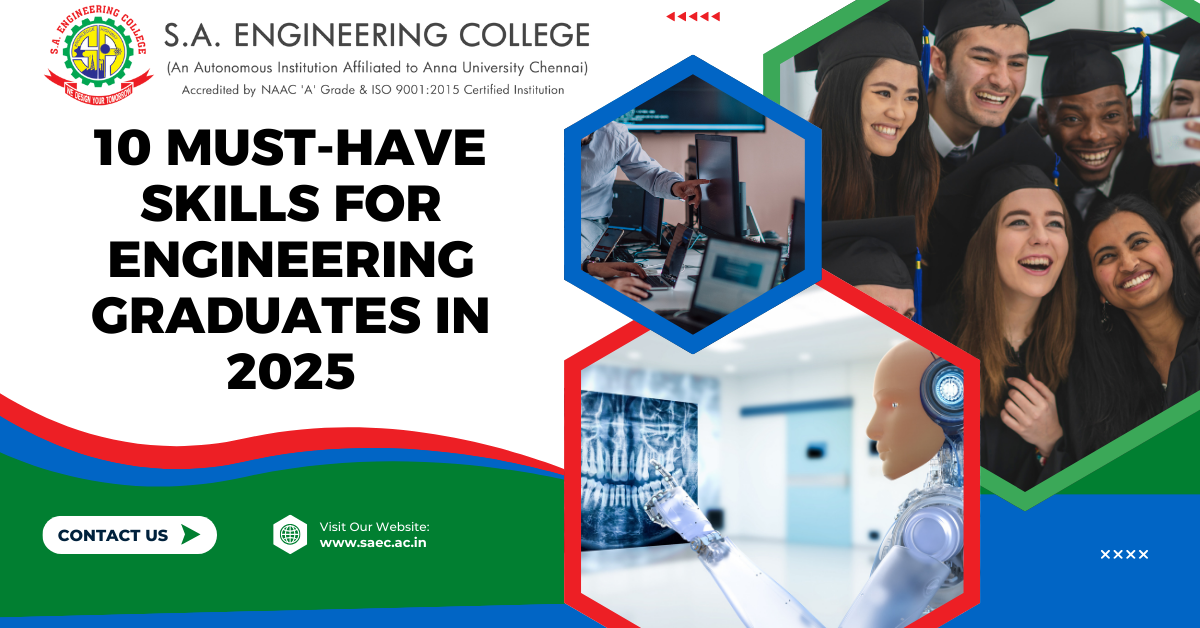
10 Must-Have Skills for Engineering Graduates in 2025
Engineering is at the forefront of technological innovation, shaping the future of industries, infrastructure, and daily life. But as the demands of the professional world evolve, so must the skills of engineering graduates. Technical expertise alone won’t cut it in 2025. Instead, a balanced combination of technical know-how, interpersonal skills, and adaptability is crucial.
Here’s an in-depth look at the top 10 skills engineering graduates need to stay ahead in this dynamic environment.
1. Problem-Solving and Analytical Thinking
Engineering revolves around identifying problems and finding optimal solutions. Whether designing a new product, troubleshooting machinery, or optimizing systems, an engineer’s ability to think critically and creatively is indispensable. In a world full of complex challenges, employers prioritize professionals who can break problems down into manageable parts, evaluate multiple solutions, and implement effective strategies.
Why It Matters:
- It fosters innovation in product design and system efficiency.
- Employers value engineers who can think beyond the obvious.
How to Master It:
- Solve puzzles, participate in strategy games, or engage in logic-building activities.
- Collaborate on problem-solving projects through case studies or academic competitions.
- Regularly practice real-world scenarios where troubleshooting is required.
2. Proficiency in Programming and AI/ML Tools
With the integration of technology into nearly every industry, programming skills are becoming non-negotiable. Familiarity with languages like Python, MATLAB, or Java, coupled with knowledge of Artificial Intelligence (AI) and Machine Learning (ML), allows engineers to work on cutting-edge technologies like IoT devices, robotics, and automation. AI and ML are particularly transformative, enabling engineers to predict system failures, optimize operations, and innovate smarter designs.
Why It Matters:
- Enhances productivity through automation.
- Expands career opportunities in high-tech industries.
How to Master It:
- Take online courses on AI/ML tools such as TensorFlow, Keras, or PyTorch.
- Engage in coding bootcamps or participate in hackathons.
- Build simple machine learning models to get hands-on experience.
3. Adaptability and Learning Agility
The engineering landscape changes rapidly, with technologies and methodologies constantly evolving. Graduates who can quickly adapt to new environments and learn emerging tools or trends are more likely to thrive. Adaptability isn’t just about technical skills—it also encompasses an openness to diverse roles and responsibilities, cultural dynamics, and unexpected challenges.
Why It Matters:
- Keeps engineers relevant amidst technological disruptions.
- Helps in navigating career shifts or organizational changes seamlessly.
How to Master It:
- Read industry news and journals regularly to stay informed.
- Experiment with new tools, even outside your area of expertise.
- Cultivate a growth mindset by taking on diverse challenges in your projects.
4. Communication and Collaboration Skills
Effective communication is vital for engineers who often interact with team members, clients, and stakeholders. From presenting technical reports to explaining complex ideas to non-technical audiences, clear communication can bridge knowledge gaps and improve teamwork. Collaborative skills are equally important in a multidisciplinary environment where engineers must coordinate with professionals from different backgrounds.
Why It Matters:
- Enhances team efficiency and project outcomes.
- Prevents miscommunication that could lead to costly errors.
How to Master It:
- Join communication-focused clubs like Toastmasters or debate societies.
- Practice explaining technical concepts in simple language.
- Work in teams during internships or group projects to refine collaboration skills.
5. Project Management
Engineers are often required to juggle multiple responsibilities, including managing timelines, budgets, and teams. Project management skills ensure that tasks are completed efficiently and within constraints. Familiarity with methodologies like Agile, Lean, or Six Sigma gives graduates a competitive edge in leading projects and optimizing workflows.
Why It Matters:
- Helps in delivering projects on time and within budget.
- Demonstrates leadership qualities to potential employers.
How to Master It:
- Earn certifications like PMP (Project Management Professional) or Scrum Master.
- Use tools like Asana, Trello, or Microsoft Project to manage tasks.
- Take ownership of small projects in academic or workplace settings.
6. Sustainability Awareness
Sustainability is no longer a choice but a necessity. Engineers must integrate environmentally friendly practices into their designs, prioritize energy efficiency, and comply with sustainability regulations. This skill is particularly relevant for industries like construction, manufacturing, and energy, where the demand for green solutions is skyrocketing.
Why It Matters:
- Meets regulatory standards and reduces environmental impact.
- Builds a reputation for responsible engineering practices.
How to Master It:
- Study sustainable design and engineering principles.
- Participate in eco-friendly design challenges or green building projects.
- Stay updated on environmental laws and standards in your industry.
7. Data Analysis and Visualization
Engineering in 2025 will rely heavily on data-driven decision-making. Whether it’s optimizing manufacturing processes or analyzing the performance of a new design, engineers must extract insights from data. Proficiency in tools like Tableau, Power BI, and Excel for visualization is equally critical to present these insights effectively.
Why It Matters:
- Provides actionable insights for better decision-making.
- Enhances the clarity of technical reports and presentations.
How to Master It:
- Take online courses in data analytics and visualization.
- Practice analyzing and visualizing datasets related to your field.
- Build dashboards to present data in a user-friendly format.
8. Leadership and Emotional Intelligence
Engineering roles increasingly involve leading teams, making leadership and emotional intelligence (EQ) essential skills. EQ enables engineers to understand their team’s needs, resolve conflicts, and create a positive work environment. Combining technical expertise with leadership qualities can open doors to managerial roles.
Why It Matters:
- Improves team cohesion and productivity.
- Makes engineers more effective in decision-making roles.
How to Master It:
- Volunteer to lead projects or events.
- Read books or attend workshops on leadership and EQ.
- Practice empathy and active listening during team interactions.
Conclusion: Engineering Success in 2025 and Beyond
The engineering field is brimming with opportunities for those equipped with the right skills. The 10 skills outlined above provide a roadmap for graduates to not only survive but thrive in the evolving industry landscape. By embracing a mix of technical, interpersonal, and adaptive skills, you can unlock your potential to become an indispensable engineer in 2025.
Are you ready to future-proof your engineering career? Start by acquiring these skills today! Explore online courses, participate in hands-on projects, and engage with professional communities to fast-track your growth. The future of engineering is here—be prepared to lead it!
You may also like

Electric Vehicles: Driving Toward a Sustainable Future


